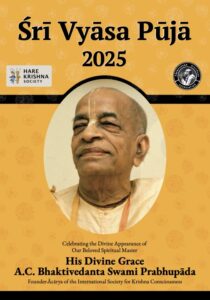Rasa bhasa-overlaping of mellows in the attempt to serve Radha Krsna-Lord Caitanya did not want to be called Krsna or be known as Krsna and to do so was and is an offense or rasa bhasa—overlaping mellows.
SB 1.2.16 purport…
The servants of God are to be respected as God by the devotees who actually want to go back to Godhead. Such servants of God are called mahātmās, or tīrthas, and they preach according to particular time and place. The servants of God urge people to become devotees of the Lord. They never tolerate being called God. Śrī Caitanya Mahāprabhu was God Himself according to the indication of the revealed scriptures, but He played the part of a devotee. People who knew Him to be God addressed Him as God, but He used to block His ears with His hands and chant the name of Lord Viṣṇu. He strongly protested against being called God, although undoubtedly He was God Himself. The Lord behaves so to warn us against unscrupulous men who take pleasure in being addressed as God.
SB 3.29.33—purport….
The word akartuḥ means “without any sense of proprietorship.” Everyone wants to act as the proprietor of his actions so that he can enjoy the result. A devotee, however, has no such desire; he acts because the Personality of Godhead wants him to act in a particular way. He has no personal motive. When Lord Caitanya preached Kṛṣṇa consciousness, it was not with the purpose that people would call Him Kṛṣṇa, the Supreme Personality of Godhead; rather, He preached that Kṛṣṇa is the Supreme Personality of Godhead and should be worshiped as such. A devotee who is a most confidential servant of the Lord never does anything for his personal account, but does everything for the satisfaction of the Supreme Lord. It is clearly stated, therefore, mayi sannyasta-karmaṇaḥ: the devotee works, but he works for the Supreme. It is also stated, mayy arpitātmanaḥ: “He gives his mind unto Me.” These are the qualifications of a devotee, who, according to this verse, is accepted as the highest of all human beings.
Adi 8.32 Sri Caitanya Mahaprabhu, the independent Supreme Personality of Godhead, is greatly magnanimous. Unless one worships Him, one can
never be liberated.
Purport- Sri Bhaktisiddhanta Sarasvati Thakura here remarks that one should
not give up the worship of Radha-Krsna to worship Sri Caitanya
Mahaprabhu. By worshiping either Radha-Krsna or Lord Caitanya alone,
one cannot become advanced. One should not try to supersede the
instructions of the six Gosvamis, for they are acaryas and very dear
to Lord Caitanya. Therefore Narottama dasa Thakura sings:
rupa-raghunatha-pade haibe akuti kabe hama bujhaba se yugala-piriti
One must be a submissive student of the six Gosvamis, from Srila
Rupa Gosvami to Raghunatha dasa Gosvami. Not following their instructions but imagining how to worship Gaurasundara and Radha-Krsna
is a great offense, as a result of which one clears a path to hell. If
one neglects the instructions of the six Gosvamis and yet becomes a
so-called devotee of Radha-Krsna, he merely criticizes the real
devotees of Radha-Krsna. As a result of speculation, he considers
Gaurasundara to be an ordinary devotee and therefore cannot make
progress in serving the Supreme Personality of Godhead, Radha-Krsna.
Madhya 8.90 purport…
….Impersonal realization of the Absolute Truth is certainly transcendental, but this does not mean that one who has attained this realization can understand the sac-cid-ānanda form of the Lord. Similarly, Paramātmā realization-realization of the plenary expansion of the Absolute Truth within everyone’s heart-is also an incomplete understanding of the Absolute Truth. Even a devotee of the Personality of Godhead Nārāyaṇa cannot actually understand the transcendental attractive features of Kṛṣṇa. Indeed, a devotee of Kṛṣṇa who is attached to the sublime attractive features of the Lord does not consider Nārāyaṇa very important. When the gopīs sometimes saw Kṛṣṇa in the form of Nārāyaṇa, they were not very attracted to Him. The gopīs never addressed Kṛṣṇa as Rukmiṇī-ramaṇa. Kṛṣṇa’s devotees in Vṛndāvana address Him as Rādhāramaṇa, Nandanandana and Yaśodānandana, but not as Vasudeva-nandana or Devakī-nandana. Although according to the material conception Nārāyaṇa, Rukmiṇī-ramaṇa and Kṛṣṇa are one and the same, in the spiritual world one cannot use the name Rukmiṇī-ramaṇa or Nārāyaṇa in place of the name Kṛṣṇa. If one does so out of a poor fund of knowledge, his mellow with the Lord becomes spiritually faulty and is called rasābhāsa, an overlapping of transcendental mellows. The advanced devotee who has actually realized the transcendental features of the Lord will not commit the mistake of creating a rasābhāsa situation by using one name for another. Because of the influence of Kali-yuga, there is much rasābhāsa in the name of extravagance and liberal-mindedness. Such fanaticism is not very much appreciated by pure devotees.
Some Conclusions-Even though,according to all the Acarya authorities, Sri Caitanya Mahaprabhu is Krsna and Radha combined, He never wanted Himself addressed as God or Krsna. We can see that in Vrndavana when Narayana showed Himself to the gopis, they were not interested at all and asked Him if He had seen Krsna? So for the gopis to address Krsna as Rukimi Ramana or Vasudeva nandana would be inapprpriate and technically it is called rasabhasa.
Hare Krsna
damaghosa das


